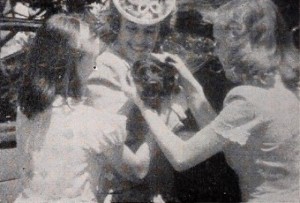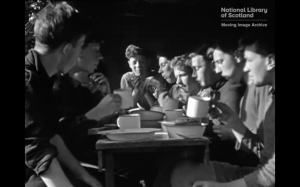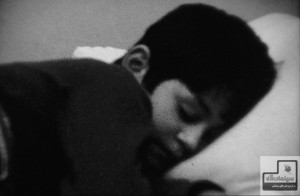
"Young Fella is a teaching film; it is also a family film. Again Walter Bergmann presents his charming household and shows the devotion of its members for pets. This time it is a young cocker spaniel that is the star. Subtitles on the proper care of dogs point up the scenes which demonstrate the advice given, as to feeding, bathing, playing and proper use of a run. Young Fella is an appealing pup and a willing actor, but the Bergmann cats steal some of the scenes in typical fashion." Movie Makers, Dec. 1948, 496.

"Glimpses of Life and Work in a School Forestry Camp "Somewhere in Scotland." (EAFA Database)
"Edited film created by Frank L. Kreznar, an award winning amateur filmmaker, documents Slovenia, Croatia, Bosnia-Herzegovina, Vojvodina, and Serbia. Most of the footage is of countryside or mountainous areas although Kreznar depicts Zagreb, Croatia, and Belgrade, Serbia. The historic Petrovaradin Fortress in Vojvodina, Serbia, is only historic building filmed. The footage of Slovenia emphasizes agriculture, while the footage of Bosnia-Herzegovina includes scenic shots of mountains and waterfalls. Kreznar also shows traditional houses in the rural areas providing a contrast to modern Soviet construction such as Soviet-style apartment buildings. Shots of urban areas also include an emphasis on the lack of cars, high volumes of pedestrian traffic, and the popularity of public transportation. He depicts churches that are still being actively used while discussing the lack of Soviet suppression of religion in Yugoslavia, and he shows the existence of privately held business enterprises such as taxi services and cafés. He also mentions that the majority of Yugoslavian agriculture is under private, family control and that private businesses with five or less employees are allowed to exist. Kreznar discusses the impact of wars between Eastern and Western Europe on this territory, showing various war memorials throughout the film. The film ends with footage of hitchhikers – mainly from countries in Western Europe – attempting to travel through the country" via the Human Studies Film Archives, Smithsonian Museum.
Film about the lives of people in Lorestan, Iran.
The story follows an old man and a young boy who dig a well together. The boy digs the well from the bottom and the old man sits at the top and empties the dirt that he pulls up in a bucket
An old man in a dust covered old house sings a song and goes about his day, walking around and cleaning. Sudden loud sounds from outside throw him into a frenzy. Unable to tell whether it’s the sound of war, a celebration, laughter or shouts of agony, he barricades himself in his house and takes refuge in his basement where he continues to sing his song again.
The story follows a little girl named “Dokhtar Bas” who catches a frog for her mother to cut open and put on her father’s infected knee injury. The next day the wound is disinfected and her father goes back to work in the wilderness. Dokhtar Bas looks at the dried up corpse of the frog and asks her mother if her father is truly healed now. Later in an attempt to revive the frog she first puts it in water, then catches another frog and like her mother cuts it open and places it on the dead frog’s corpse, tying them together. Checking the bandaged bundle the next morning she discovers two dead frogs and she asks her mother again whether her father really is completely healed now.

The film follows a group of children living in the same alley. The garbage truck arrives every day disrupting their dreams. The sleepy children are forced to take the garbage out every time and play in the alley after the garbage are taken. The garbage truck stops coming to their alley, allowing them to finally sleep and dream for longer but also results in the neighbours throwing garbage in the alley, stopping the children from playing together.
Total Pages: 203